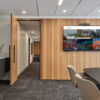If two years of pandemic life has taught us anything, it’s that flexibility, adaptability, and creativity are essential for navigating uncertainty. Now, there’s a Canadian construction company embodying these virtues, offering an innovative approach to, as Martin Samson with Falkbuilt Ottawa puts it, “creating spaces where people actually want to go back to work in person.”
From concept to installation, your new office interior could be ready in as little as eight weeks thanks to digital-component construction by Falkbuilt, the construction arm of commercial interior specialist and furniture provider Burovision.
“The factory is like a giant 3D printer,” explains Samson, referring to the 90,000 sq ft Calgary facility where all the custom construction components are produced.
One of those custom components is cladding, a high-density fiberboard used in place of drywall. It’s manufactured to each project’s specifications, and then shipped from Calgary to job sites around the world where it is installed easily and with virtually no waste onsite.

The density of cladding provides superior room acoustics and soundproofing and, since all components are custom cut in the factory, production is nearly waste-free. In addition to being manufactured from recycled sawdust and wood shavings, cladding is biodegradable and compostable, making it one of the most sustainable materials in existence.
Cladding is also substantially sturdier than drywall – you can hang 700 pounds directly off the wall. It also offers affordable customization, with a solid colour section costing practically the same as printing that same section as an art mural.
During the design process, real-time choices are made using 3D modeling software, which can also be used during virtual meetings. Clients can also make modifications right up until the time of production as AI software tracks every piece of material used in a project, and all the pieces can be rearranged as needed.
“It’s like having a LEGO® kit. You can make it into something else later without having to throw anything out,” says Samson.
Limiting the environmental impact
Construction waste represents half of what goes to landfills in North America each year. Approximately 30 per cent of materials are disposed of, creating massive inefficiencies and pollution.
“Drywall is non-renewable and not easily recyclable,” explains Samson. “More than 100 million tonnes of construction waste ends up in the landfill annually and about a third of that is drywall. We avoid all that.”
With just a few commonly available materials involved in the production of Falkbuilt’s office systems, the company is largely insulated from material shortages plaguing the construction industry. As well, office solutions are relatively quick to install, and can usually be set up in a matter of days.

“At Falkbuilt, we are flipping the age-old equation of labour versus material. Thirty per cent of project budget is typically invested in materials and 70 per cent in labour,” says Samson. “Our clients invest 70 per cent in a custom solution and pay only 30 per cent on labour. We’ve found ways to cut labour costs by 80 per cent.”
Falkbuilt Ottawa is one of 102 global Falkbuilt locations. The company is only three and a half years old and has grown rapidly in that time from six to nearly 500 employees.
In Ottawa, Falkbuilt has established its client base over the last 17 months, with a growing focus on serving the federal government, health care teams, educational institutions, and corporate environments.
The company’s signature “Falkpods” – a room within a room – are particularly popular with Ottawa clients and can be integrated with productivity technologies such as screens, magnetic whiteboards, and digital writing surfaces.
“As time evolves, you can’t change design with drywall. Space becomes less relevant,” explains Samson. “Falkbuilt provides a way to make your space perform to what it needs to be, now and into the future.”

